SPRING 2023 WORLD BANK GROUP Publications & eProducts Publications
WORLD BANK PUBLICATIONS worldbank.org/publications
SCRIBD scribd.com/worldbankpublications


OPEN KNOWLEDGE REPOSITORY openknowledge.worldbank.org ISSUU issuu.com/world.bank.publications
WORLD BANK ELIBRARY elibrary.worldbank.org

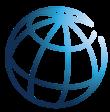


GOOGLE

Connect With Us II www.worldbank.org/publications •
WORLD BANK PUBLICATIONS AND ePRODUCTS TABLE OF CONTENTS Ordering World Bank Publications
Flagship Titles ............................................. 1 F eatured Titles .......................................... 15 A frica............................................................21 South
East
International Development In Practice ........ 25 Systematic Country Diagnostic ................... 25 Online Resources ....................................... 26 World Bank eLibrary Sales Agents .............. 27 Index ........................................................ 28 World Bank Publications Distributors ...........III
BOOKS books.google.com Access to World Bank Publications To make our content accessible to as many readers as possible, most publications are available for free online. Read, share, and download at:
books@worldbank.org
United States customers, order on Amazon.com, where all of our current and backlist titles are available. International customers, please refer to the list of local distributors on the inside back cover. LIKE US ON FACEBOOK facebook.com/worldbankpublications FOLLOW US ON TWITTER twitter.com/WBPubs SUBSCRIBE TO PUBLICATIONS ANNOUNCEMENTS newsletters.worldbank.org SUBSCRIBE TO YOUTUBE CHANNEL bit.ly/WBPubYouTube
Asia....................................................22
Asia and Pacific....................................23 International Development In Focus.............24
WORLD DEVELOPMENT REPORT 2023
Migrants, Refugees, and Societies
By the World Bank
Mobility is an integral part of the development process. It is a mechanism for reallocating labor across economic sectors and geographical areas. It enables adaptation to shocks, stresses, and imbalances. Cross-border mobility inevitably comes with economic and social consequences for those who move, their communities of origin, and their destinations.
How can we manage cross-border mobility in a manner that is beneficial to all? This question is key to achieving the development mandate of the World Bank Group, as well as the Sustainable Development Goals.
The World Development Report 2023 takes a fresh look at these issues. It shifts from a narrow focus on labor markets for migrants and legal protection for refugees to a more holistic perspective—one that recognizes the humanity of migrants and the complexity of the societies of origin and destination. The Report focuses on three main themes: drivers of mobility and the role of development; impacts and policy responses; and the need for collective action to strengthen the nexus between international protection and development. While recognizing that situations are very diverse and that there can be no one-size-fits-all approach, it seeks to identify policy options for each group of stakeholders—migrants' origin and destination countries, refugee-hosting countries, the international community, and development actors, as well as the private sector and civil society—to deliver a system of better mobility in a transforming world.
WORLD DEVELOPMENT REPORT
March 2023. 280 pages. Stock no. C211941 (ISBN: 978-1-4648-1941-4). US$49.50
ALSO AVAILABLE IN HARDBACK
WORLD DEVELOPMENT REPORT 2023
Migrants, Refugees, and Societies

March 2023. 280 pages. Stock no. C211963 (ISBN: 978-1-4648-1964-3). US$66
phone +1 (703) 661 1580 • in the U.S. phone +1 (800) 645 7247 • fax +1 (703) 661 1501
1
WORLD BANK PUBLICATIONS AND ePRODUCTS FLAGSHIP TITLES
GLOBAL ECONOMIC PROSPECTS, JANUARY 2023
By the World Bank
GLOBAL ECONOMIC PROSPECTS
January 2023. 236 pages. Stock no. C211906 (ISBN: 978-1-4648-1906-3). US$49.50
COMING SOON
Global growth is expected to decelerate sharply, reflecting synchronous policy tightening aimed at containing very high inflation, worsening financial conditions, and continued disruptions from Russia’s invasion of Ukraine. Investment growth in emerging market and developing economies (EMDEs) is expected to remain below its average rate of the past two decades.
Further adverse shocks could push the global economy into recession. Small states are especially vulnerable to such shocks because of the reliance on external trade and financing, limited economic diversification, elevated debt, and susceptibility to natural disasters. Against this backdrop, it is critical that EMDE policy makers ensure that any fiscal support is focused on vulnerable groups, that inflation expectations remain well anchored, and that financial systems continue to be resilient. Urgent global and national efforts are also needed to mitigate the risks of global recession and debt distress in EMDEs and to support a major increase in EMDE investment.
Global Economic Prospects is a World Bank Group Flagship Report that examines global economic developments and prospects, with a special focus on EMDEs, on a semiannual basis (in January and June). Each edition includes analytical pieces on topical policy challenges faced by these economies.

GLOBAL ECONOMIC PROSPECTS, JUNE 2023
June 2023. 194 pages. Stock no. C211951 (ISBN: 978-1-4648-1951-3). US$49.50
2 www.worldbank.org/publications • books@worldbank.org WORLD BANK PUBLICATIONS AND ePRODUCTS FLAGSHIP TITLES
COLLAPSE AND RECOVERY

How the COVID-19 Pandemic Eroded Human Capital and What to Do about It
By Norbert Schady, Alaka Holla, Shwetlena Sabarwal, Joana Silva, and Andres Yi Chang
The COVID-19 pandemic has dealt a severe blow to human capital. This report presents new evidence and analysis to provide a comprehensive diagnostic of the effects of the pandemic on human capital outcomes and identify promising policy responses for governments faced with the task of rebuilding human capital in the wake of the pandemic.
The report identifies the mechanisms through which COVID-19 affected the human capital of people at different points in the life cycle and provides estimates of the magnitude of these losses. This analysis underlines differences in impact across countries and groups within countries to understand the nature and extent of the inequitable impact on human capital, and how it has exacerbated existing gaps and created new ones. Grounded in the diagnostic, the report discusses policy responses that target the short-term needs of afflicted groups, as well as the medium- to long-term agenda to build back better human capital and make systems more resilient. The long-term policy discussion recognizes COVID-19 as an inflection point, using the opportunity to reimagine systems and institutions, thinking in a completely different way about some key issues.
In conclusion, the report reflects on what we have learned from failed policy responses. It further analyzes the innovations that proved successful across sectors in preventing or mitigating human capital losses associated with the COVID-19 crisis, and it explores how these lessons can be incorporated across sectors going forward.
February 2023. 164 pages. Stock no. C211901 (ISBN: 978-1-4648-1901-8). US$43.95
phone +1 (703) 661 1580 • in the U.S. phone +1 (800) 645 7247 • fax +1 (703) 661 1501
3
WORLD BANK PUBLICATIONS AND ePRODUCTS FLAGSHIP TITLES
DETOX DEVELOPMENT
Repurposing Environmentally Harmful Subsidies
By Richard Damania, Esteban Balseca, Charlotte De Fontaubert, Joshua Gill, Kichan Kim, Jun Rentschler, Jason Russ, and Esha Zaveri
This report examines the impacts of subsidies on the world's stock of foundational natural capital—clean air, land, and oceans. These natural assets are critical for human health and nutrition. They underpin much of the economy, but they suffer from degradation, poor management, and overutilization due to government subsidies.

February 2023. 310 pages. Stock no. C211916 (ISBN: 978-1-4648-1916-2). US$49.50
Explicit and implicit subsidies—estimated to be at least US$7 trillion—not only promote inefficiencies but also cause much environmental harm. Poor air quality is responsible for approximately 1 in 5 deaths globally. And as the new analyses in this report show, a significant amount of these deaths can be attributed to fossil fuel subsides. The largest user of land worldwide is agriculture, which feeds the world and employs 1 billion people, including 78 percent of the world's poor. But it is subsidized in ways that promote inefficiency, inequity, and unsustainability. Subsidies are shown to drive the deterioration of water quality and increase water scarcity by incentivizing overextraction. In addition, they are responsible for 14 percent of annual deforestation, by incentivizing the production of crops that are cultivated near forests. These subsidies are also implicated in the spread of zoonotic and vector-borne diseases, especially malaria. Finally, oceans that support the world's fisheries and supply about 3 billion people with almost 20 percent of their protein intake from animals are in a collective state of crisis; more than 34 percent of fisheries are overfished, a practice that is exacerbated by open access regimes and capacity increasing subsidies.
Although the literature on subsidies is large, this report fills significant knowledge gaps using new data and methods. In doing so, it enhances the understanding of the scale and impact of subsidies, and it offers solutions to reform or repurpose them in efficient and equitable ways. The aim is to enhance the understanding of the magnitudes, consequences, and drivers of policy success and failures to render reforms more achievable.
4 www.worldbank.org/publications • books@worldbank.org WORLD BANK PUBLICATIONS AND ePRODUCTS FLAGSHIP TITLES
THRIVING
Making Cities Green, Resilient, and Inclusive in a Changing Climate
By Megha Mukim and Mark Roberts, Editors
Between 1970 and 2021, the number of people living in cities increased from 1.19 billion to 4.46 billion, while the Earth's surface temperature climbed by 1.19 degrees Celsius above its preindustrial levels. Because of the prosperity they helped generate, cities have been a major cause of this climate change. However, it is also in cities that many of the solutions to the climate crisis—in terms of both adaptation and mitigation—will be found, not least because by 2050, almost 70 percent of the world's population will call cities home. As such, cities are the key to arguably the greatest public policy challenge of our times.
To take stock of how green, how resilient, and how inclusive cities globally are today, Thriving: Making Cities Green, Resilient, and Inclusive in a Changing Climate defines a global typology of more than 10,000 cities. It finds that there is wide variation in how green, resilient, and inclusive cities are around the world. It asks how climate change impacts cities and, conversely, how cities affect climate. Vicious cycles in development could occur as cities become more vulnerable to extreme events and the challenges compound and cascade. Finally, this report provides a compass for policy makers on policies that can help cities not only survive but also thrive in the face of the perils of climate change. Policy makers can and must act now to chart a more sustainable trajectory.

March 2023. 350 pages. Stock no. C211935 (ISBN: 978-1-4648-1935-3). US$49.50
phone +1 (703) 661 1580 • in the U.S. phone +1 (800) 645 7247 • fax +1 (703) 661 1501
5
WORLD BANK PUBLICATIONS AND ePRODUCTS FLAGSHIP TITLES
OFF THE BOOKS
Understanding and Mitigating the Fiscal Risks of Infrastructure
By Matías Herrera Dappe, Vivien Foster, Aldo Musacchio, Teresa Ter-Minassian, and Burak Turkgulu
OFF the BOOKS
Understanding and Mitigating the Fiscal Risks of Infrastructure

Developing countries face massive infrastructure needs, but public spending on infrastructure is inadequate, and public investment has declined in recent years. Rising debt levels and tightening fiscal and monetary conditions are putting further pressure on the funds available for infrastructure, heightening the importance of increasing the efficiency of infrastructure spending.
Off the Books: Understanding and Mitigating the Fiscal Risks of Infrastructure shows that however governments deliver infrastructure—through direct public provision, state-owned enterprises (SOEs), or public-private partnerships (PPPs)—the risk of fiscal surprises is high, in both good times and bad. As a result, infrastructure service delivery often ends up costing significantly more than expected, eroding limited fiscal space for productive spending.
SUSTAINABLE INFRASTRUCTURE
February 2023. 180 pages. Stock no. C211937 (ISBN: 978-1-4648-1937-7). US$43.95
This book makes a unique contribution by quantifying the magnitude and prevalence of fiscal risks from electricity and transport infrastructure and identifying their root causes across a range of low- and middle-income countries. Drawing on important new sources of evidence and compiling many others, the analysis sheds lights on just how much is at stake in the good governance of infrastructure sectors. It allows policy makers to weigh the magnitudes of different types of risks and examine how they vary across contexts.
Off the Books shows how a deeper understanding of the fiscal risks of infrastructure can help policy makers target reforms to areas where they can be expected to have the greatest impact. It lays out a reform agenda for mitigating the fiscal risks associated with infrastructure based on building government capacity; adopting integrated public investment management and integrated fiscal risk management; improving fiscal and corporate governance of SOEs; and ensuring robust PPP preparation, procurement, and contract management. The book will be of enormous value to policy makers, practitioners, and academics with an interest in infrastructure and fiscal policy.
6 www.worldbank.org/publications • books@worldbank.org WORLD BANK PUBLICATIONS AND ePRODUCTS FLAGSHIP TITLES
Matías Herrera Dappe Vivien Foster Aldo Musacchio Teresa Ter-Minassian Burak Turkgulu
THE ECONOMICS OF ELECTRIC VEHICLES FOR PASSENGER TRANSPORTATION
 By Cecilia Briceno-Garmendia, Wenxin Qiao, and Vivien Foster
By Cecilia Briceno-Garmendia, Wenxin Qiao, and Vivien Foster
Electric mobility has garnered growing interest and significant momentum across several major global markets, often motivated by transport sector decarbonization. Together, Europe, China, and the United States account for more than 90 percent of the world's electric vehicle fleet. For many OECD countries, electric mobility is seen primarily as a lever for transport sector decarbonization, given that many of the other relevant policy options have already been exhausted. This report finds that electric mobility is also increasingly relevant for low- and middle-income countries (LMICs).
As of today, electric mobility for passengers is a comparative rarity across LMICs. In some of the leading markets, such as Brazil, India, and Indonesia, electric vehicles account for less than 0.5 percent of total sales. There are signs that this situation is changing. India, Chile, and Brazil are leading the way in electrifying their bus fleets in their largest cities by introducing innovative financing practices and improved procurement practices. Batteryswapping schemes are taking off in Asian and East African countries to lower the upfront cost of two-and three-wheelers. Original modeling for this report suggests that established global policy targets, such as 30 percent of new passenger vehicles to be electric by 2030, will make economic sense for many LMICs under a wide range of possible scenarios.
SUSTAINABLE INFRASTRUCTURE
March 2023. 230 pages. Stock no. C211948 (ISBN: 978-1-4648-1948-3). US$49.50
phone +1 (703) 661 1580 • in the U.S. phone +1 (800) 645 7247 • fax +1 (703) 661 1501
7
WORLD BANK PUBLICATIONS AND ePRODUCTS FLAGSHIP TITLES
THE PATH TO 5G IN THE DEVELOPING WORLD

Planning Ahead for a Smooth Transition to the Fifth Generation of Mobile Technology
By Rami Amin, Niccolo Comini, Vivien Foster, Natalija Gelvanovska-Garcia, Kay Kim, Hyea Won Lee, Maria Claudia Pachon, Je Myung Ryu, and Zhijun William Zhang
The global race for 5G has seen countries riding a new wave of wireless technology. 5G is the next-generation mobile communication technology, with the capacity to enable a significantly higher level of performance over 4G mobile communications. It provides a new layer of connectivity to support innovative, data-intense applications. With the estimated impact of 5G on global GDP in the trillions of US dollars, 5G will drive innovation, job creation, productivity, and competitiveness across a range of sectors, with many new use cases currently being tested.
For some countries, 5G services may seem a distant future prospect, given the costs of infrastructure deployment and expensive handsets; for others, it is an onramp to the Fourth Industrial Revolution and has been folded into national strategy planning. 5G trials, pilots, and commercial deployments have been progressing across the world, but most deployments are in higherincome countries. Significant barriers remain for developing countries—many of which pertain to challenges faced by the broader telecommunications sector—that threaten to further widen the digital divide and limit access to the economic opportunities that 5G connectivity enables.
SUSTAINABLE INFRASTRUCTURE
April 2023. 200 pages. Stock no. C211604 (ISBN: 978-1-4648-1604-8). US$48.50
What does this mean for developing countries, and how can governments prepare? This flagship report surveys the technical capabilities of 5G and explores how it can help countries reach connectivity goals by using 5G as a layer of connectivity alongside 4G and other modalities of connectivity. It also provides a guide for policy makers to better understand the opportunities, challenges, and risks posed by 5G so that they can plan for an enabling policy and regulatory ecosystem that supports the path to advanced mobile network deployment, access, and adoption.
8 www.worldbank.org/publications • books@worldbank.org WORLD BANK PUBLICATIONS AND ePRODUCTS FLAGSHIP TITLES
DIGITAL AFRICA
Technological Transformation for Jobs
By Tania Begazo, Moussa Blimpo, and Mark Dutz
African countries need more jobs and better jobs for their growing populations. The main message of Digital Africa: Technological Transformation for Jobs is that broader use of productivity-enhancing technologies by enterprises can generate such jobs, including for lower-skilled people. The adoption of better technologies can support countries' short-term objective of economic recovery, as well as their vision of economic transformation with more inclusive growth. But this process is not automatic.
Although mobile internet availability has increased in recent years, Africa's uptake gap is the highest in the world. While 83 percent of Africa's population now live in areas with some level of 3G mobile internet services, only 27 percent of these people are using such services. And the average African business lags in the use of smartphones and computers, as well as more sophisticated digital technologies, relative to the rest of the world. Affordability explains part of the usage gap: with 40 percent of Africans still falling below the extreme poverty line, expenses in mobile data plans alone would constitute one-third of their low incomes. Small- and medium-sized businesses have more expensive data plans than in other regions. In addition to people's ability to pay, shortcomings—in the quality of internet services and in the entrepreneurship supply of attractive, skills-appropriate apps that could raise people's earnings—dampen their willingness to use these new technologies.
The development payoffs to those already using these technologies are significant. The book offers robust evidence that internet availability has a positive impact on increasing jobs and reducing poverty in African countries. New empirical studies undertaken for this report have added to the rapidly growing literature on the direct impact of mobile internet availability on jobs and welfare.

For these and other benefits to be realized more widely, two sets of complementary and mutually reinforcing policies are required. Policies must address potential users' ability to pay for them, as well as their willingness to use them.
March 2023. 190 pages. Stock no. C211737 (ISBN: 978-1-4648-1737-3). US$48.50
phone +1 (703) 661 1580 • in the U.S. phone +1 (800) 645 7247 • fax +1 (703) 661 1501
9
WORLD BANK PUBLICATIONS AND ePRODUCTS FLAGSHIP TITLES
Can Better Governance and Management of Scarcity Prevent a Looming Crisis in the Middle
January 2023. 128 pages. Stock no. C211661 (ISBN: 978-1-4648-1661-1). US$48.50
Across the Middle East and North Africa (MENA) region, land is a scarce and valuable resource. The projected increase in land demand due to demographic trends, coupled with decreasing land supply due to climatic and governance factors, indicate a looming crisis happening at a time when the region is also facing dramatic social and political transformation. Reserves for land cultivation are almost exhausted, while total built-up area will need to expand to accommodate high demographic growth. Yet, land remains inefficiently, inequitably, and unsustainably used. There are strong barriers to land access for both firms and individuals. Firms resort to political connections to access land, resulting in land misallocation. Women are 2 to 3 times more likely to fear losing their property in the case of spousal death or divorce, and their rights are not sufficiently supported by institutions and gender-imbalanced social norms. Refugees also face difficulties in accessing land; conflict in the region is causing the displacement of millions of people who lack necessary housing, land, and property rights.
This report identifies and analyzes the economic, environmental, and social challenges associated with land in MENA countries, shedding light on policy options to address them. It focuses on two main constraints—scarcity of land and weak land governance—and how they affect land use and access, the resulting inefficiencies and inequities, and associated economic and social costs. It highlights the need for MENA countries to think about land more holistically and to reassess the strategic trade-offs involving land, while minimizing land distortions and serving economic development. It is also an attempt to fill major data gaps and promote a culture of open data, transparency, and inclusive dialogue on land. These efforts are important steps that will contribute to renewing the social contract, accompany economic and digital transformation, and facilitate recovery and reconstruction in the region.

January 2023. 114 pages. Stock no. C 211889 (ISBN: 978-1-4648-1889-9). US$43.95

10
WORLD BANK PUBLICATIONS AND ePRODUCTS FLAGSHIP TITLES
www.worldbank.org/publications • books@worldbank.org
Can Better Governance and Management of Scarcity Prevent a Looming Crisis in the Middle East and North Africa?
ALSO AVAILABLE IN ARABIC LAND MATTERS
THE ECONOMICS OF WATER SCARCITY IN THE MIDDLE EAST AND NORTH AFRICA
Institutional Solutions
By Dominick de Waal, Stuti Khemani, Andrea Barone, and Edoardo Borgomeo
Despite massive infrastructure investments, countries in the Middle East and North Africa (MENA) region continue to face unprecedented water scarcity due to climate change, population growth, and socioeconomic development. Current policy regimes for managing water across competing needs are primarily determined by state control of large infrastructure. Policy makers across the region understand that allocations are unsustainable and that increasing investments in new infrastructure and technologies to increase water supply place a growing financial burden on governments. However, standard solutions for demand management—reallocating water to higher value uses, reducing waste, and increasing tariffs—pose difficult political dilemmas that, more often than not, are left unresolved. Without institutional reform, the region will likely remain in water distress even with increased financing for water sector infrastructure.
The Economics of Water Scarcity in the Middle East and North Africa: Institutional Solutions confronts the persistence and severity of water scarcity in MENA. The report draws on the tools of public economics to address two crucial challenges facing states in MENA: lack of legitimacy and trust. Evidence from the World Values Survey shows that people in the region believe that a key role of government is to keep prices down and that governments are reluctant to raise tariffs because of the risk of widespread protests. Instead of avoiding the "politically sensitive" issue of water scarcity, this report argues that reform leaders and their external partners can reform national water institutions and draw on local political contestation to establish a new social contract. The crisis and emotive power of water can be used to bolster legitimacy and trust in the region and build a sustainable, inclusive, thriving economy that is resilient to climate change.

April 2023. 218 pages. Stock no. C211739 (ISBN: 978-1-4648-1739-7). US$43
phone +1 (703) 661 1580 • in the U.S. phone +1 (800) 645 7247 • fax +1 (703) 661 1501
11
WORLD BANK PUBLICATIONS AND ePRODUCTS FLAGSHIP TITLES
PRODUCTIVITY THROUGH A SPATIAL LENS

Overcoming Subnational Barriers to Economic Growth and Competitiveness in Latin America and the Caribbean
By Elena Ianchovichina
The problem of low economic growth in Latin America and the Caribbean has puzzled economists for decades. Numerous explanations have been provided over the years, yet none focuses on the inefficiencies in the region’s spatial development model. This study adopts a spatial lens to shed light on weaknesses in competitiveness that have left the region unprepared to fully realize the potential of its mostly urban workforce and to take advantage of opportunities in a post-pandemic economy reshaped by geopolitical shifts.
Productivity through a Spatial Lens first reviews territorial productivity trends. It discusses the forces that reduced spatial income disparities but also dampened urban productivity in the years leading to the pandemic. The investigation then explores the reasons for the puzzle of low urban productivity in a region of dense cities. The report concludes with ideas on how to improve competitiveness and prospects for sustainable and inclusive growth.
LATIN AMERICAN AND CARIBBEAN STUDIES
June 2023. 140 pages. Stock no. C211959 (ISBN: 978-1-4648-1959-9). US$43.95
ALSO AVAILABLE IN THIS SERIES
EMPLOYMENT IN CRISIS
The Path to Better Jobs in a Post-COVID-19 Latin America
October 2021. 156 pages. Stock no. C 211672 (ISBN: 978-1-4648-1672-7). US$43
12 www.worldbank.org/publications • books@worldbank.org WORLD BANK PUBLICATIONS AND ePRODUCTS FLAGSHIP TITLES
AMBIENT AIR POLLUTION AND PUBLIC HEALTH IN SOUTH ASIA
 By Muthukumara S. Mani
By Muthukumara S. Mani
Air pollution exposure is the second-most important risk factor for ill health in South Asia, contributing to between 13 percent and 22 percent of all deaths. Also, approximately 58 million disability-adjusted life years (DALYs) are lost through chronic and acute respiratory and cardiovascular illnesses. Of the top 30 cities in the world with the poorest air quality in 2016, 17 are in South Asia. The impact of air pollution transcends boundaries. Although countries have introduced promising initiatives in recent years, comprehensive healthcentered strategies are lacking.
The multiplicity of sources and modes of exposure add complexity to the problem of air pollution in South Asia. In addition to a rapidly growing road transport sector, factories and power plants, as well as agricultural and solid waste, contribute to air pollution.
Many measures are often discussed to deal with air pollution, including transitioning to a low emissions fleet, increasing public transportation, updating fuel emissions standards and improving traffic flow management, closing old inefficient plants or retrofitting existing coal-fired plants, a switch to cleaner fuel and more efficient production in industries, and better management of landfills and agricultural waste. The challenge is that implementation of these measures would require a better understanding of the spatial dimensions of pollution and underlying sources, as well as the costs and benefits associated with the deployment of several instruments.
Governments are often confronted with these difficult questions: Which interventions are warranted? Up to what cost? Where? When? Obtaining better information and managing risks more effectively will help policy makers deal with the host of uncertainties without compromising their broader objectives of economic growth and poverty reduction.
This report aims to identify and map air pollution hotspots in South Asia in terms of concentration and exposure, understand the various sources of pollution in hotspot areas from Kabul to Dhaka, and help categorize policy actions and interventions based on a systematic analysis of costs and benefits.
April 2023. 200 pages. Stock no. C211831 (ISBN: 978-1-4648-1831-8). US$49.50
phone +1 (703) 661 1580 • in the U.S. phone +1 (800) 645 7247 • fax +1 (703) 661 1501
13
WORLD BANK PUBLICATIONS AND ePRODUCTS FLAGSHIP TITLES
SOUTH ASIA DEVELOPMENT MATTERS
JOBS UNDONE
Reshaping the Role of Governments toward Markets and Workers in the Middle East and North Africa
By Asif M. Islam, Dalal Moosa, and Federica Saliola
A decade after the spark of the Arab Spring, the Middle East and North Africa (MENA) region continues to suffer from limited creation of more and better jobs. Youth face idleness and unemployment. For those who find jobs, informality awaits. Few women attempt to enter the world of work at all. Meanwhile, the available jobs are not those of the future. These labor market outcomes are being worsened by the coronavirus (COVID-19) pandemic.
July 2022. 164 pages. Stock no. C211735 (ISBN: 978-1-4648-1735-9). US$48.50
Jobs Undone: Reshaping the Role of Governments toward Markets and Workers in the Middle East and North Africa explores ways to break these impasses, drawing on original research, survey data, wide-ranging literature, and young entrepreneurial voices from the region. The report finds that a prominent reason behind MENA's unmet jobs challenge is a lack of market contestability in the formal private sector. Few firms in the region enter the market, few grow, and those that exit are not necessarily less productive. Moreover, firms in the region invest little in physical capital, human capital, or research and development, and they tend to be politically connected. At the macro level, economic growth has been mediocre, labor productivity is not being driven by structural change, and the growth of the stock of capital per capita has declined.

New evidence generated for this report shows that the lack of dynamism is due to the prevalence of state-owned enterprises (SOEs). They operate in sectors where there is little economic rationale for public activity, and they enjoy favorable treatment—flouting the principles of competitive neutrality. Meanwhile, labor regulations add to market rigidity, while gendered laws restrict women's potential.
To change this reality, the state must reshape its relationship toward markets, toward workers, and toward women. All reforms will have to rely on improved data capacity and transparency to create a new social contract between governments and the people of the region.
ALSO AVAILABLE IN ARABIC
JOBS UNDONE
Reshaping the Role of Governments toward Markets and Workers in the Middle East and North Africa
September 2022. 156 pages. Stock no. C 211863 (ISBN: 978-1-4648-1863-9). US$48.50
14 www.worldbank.org/publications • books@worldbank.org WORLD BANK PUBLICATIONS AND ePRODUCTS FLAGSHIP TITLES
WOMEN, BUSINESS AND THE LAW 2023
By the World Bank
Women, Business and the Law 2023 is the ninth in a series of annual studies measuring the laws and regulations that affect women's economic opportunity in 190 economies. The project presents eight indicators structured around women's interactions with the law as they move through their careers: Mobility, Workplace, Pay, Marriage, Parenthood, Entrepreneurship, Assets, and Pension. Women, Business and the Law 2023 identifies barriers to women's economic participation and encourages reform of discriminatory laws.
This year, the study also includes research, literature review, and analysis of 52 years of reforms. By examining the economic decisions women make throughout their working lives, as well as tracking regulatory changes from 1970 to today, Women, Business and the Law makes an important contribution to research and policy discussions about the state of women's economic empowerment. The indicators build evidence of the critical relationship between legal gender equality and women's employment and entrepreneurship.
WOMEN, BUSINESS AND THE LAW 2023
WOMEN, BUSINESS AND THE LAW
March 2023. 120 pages. Stock no. C211944 (ISBN: 978-1-4648-1944-5). US$43.95

INTERNATIONAL DEBT REPORT 2022

Updated International Debt Statistics
By the World Bank
The International Debt Report (IDR), formerly International Debt Statistics (IDS), is a longstanding annual publication of the World Bank featuring external debt statistics and analysis for the 121 low- and middle-income countries (LMICs) that report to the World Bank Debtor Reporting System. IDR 2022 includes (1) an analyses of external debt stocks and flows from 2010 to 2021 for these countries; (2) an assessment of the evolution of the creditor composition of external debt over the past decade; (3) a focus on how the World Bank has sought to enhance data quality and transparency against the backdrop of rapidly changing global debt dynamics that contribute to debt transparency issues; (4) tables and charts detailing debtor and creditor composition of debt stock and flows, terms volume and terms of new commitments, maturity structure of future debt service payments and debt burdens; and (5) a one-page summary for each country, plus global, regional, and income-group aggregates showing debt stocks and flows, relevant debt indicators, and metadata for 6 years (2010 and 2017–2021).

Unique in its coverage of the important trends and issues fundamental to the financing of LMICs, IDR 2022 is an indispensable resource for governments, economists, investors, financial consultants, academics, bankers, and the entire development community.
INTERNATIONAL DEBT REPORT
January 2023. 204 pages. Stock no. C211902 (ISBN: 978-1-4648-1902-5). US$49.95
15 phone +1 (703) 661 1580 • in the U.S. phone +1 (800) 645 7247 • fax +1 (703) 661 1501
WORLD BANK PUBLICATIONS AND ePRODUCTS FEATURED TITLES
THE POLITICAL ECONOMY OF CLIMATE ACTION
 By Stephane Hallegatte, Paolo Avner, Ira Dorband, Catrina Godinho, Dirk Heine, Penelope Mealy, and Jun Rentschler
By Stephane Hallegatte, Paolo Avner, Ira Dorband, Catrina Godinho, Dirk Heine, Penelope Mealy, and Jun Rentschler
Climate change is a defining challenge of our time—and we know how to stop it: stabilize the climate by cutting emissions to net zero by mid-century, while developing pathways to resilient, sustainable development. The world has committed to doing just that, and 139 countries and counting already have net zero targets in place. But commitments are not yet translating into policies and investments at the pace or scale required, because they are often hampered by politics, vested interests, and competing needs.
CLIMATE CHANGE AND DEVELOPMENT
April 2023. 120 pages. Stock no. C211953 (ISBN: 978-1-4648-1953-7). US$43.95
This report looks at the political economy of the net zero policy, from the common challenges to the development of strategies to overcome them. It shows how governments can improve political economy conditions over time with progressive climate governance interventions, while overcoming more immediate barriers with better policy design and communication. By addressing political economy issues, such as distributional conflicts or ideational opposition, these strategies can unlock progress to increase the feasibility, fairness, and effectiveness of net zero policy—thus turning climate goals into climate action.
NATURE'S FRONTIERS
Achieving Sustainability, Efficiency, and Prosperity with Natural Capital
 By
By
The great expansion of economic activity since the end of the Second World War has raised living standards around the globe, but resulting declines in natural capital like land degradation, air pollution, carbon emissions, and the loss of biodiversity are threatening to reverse much of this progress. Recognizing the essential services provided by natural capital, this report proposes a novel approach to address these foundational challenges of sustainability. By combining innovative science, new data sources, and cutting edge biophysical and economic models, sustainable resource efficiency frontiers are built to assess how countries can sustainably use their natural capital in more efficient ways.
ENVIRONMENT AND SUSTAINABLE DEVELOPMENT
February 2023. 234 pages. Stock no. C211923 (ISBN: 978-1-4648-1923-0). US$49.50
The report finds that there are very significant efficiency gaps in nearly every country in the world, and closing these gaps can address many of the world's pressing economic and environmental problems. More efficient use of land could sequester an additional 85.6 billion metric tons of CO2eq, with no adverse economic impacts. Likewise, better management of land, water, and other inputs could increase food production to levels needed to feed the world to 2050—without the loss of biodiversity or greenhouse gas (GHG) storage and sequestration provided by natural habitats. More efficient air pollution policies could prevent an additional 366,000 premature deaths each year, with the same levels of spending. Although achieving these objectives will entail demanding policy reforms, the costs of inaction will be far higher.
16 www.worldbank.org/publications •
WORLD BANK PUBLICATIONS AND ePRODUCTS FEATURED TITLES
books@worldbank.org
Richard Damania, Stephen Polasky, Mary Ruckelshaus, Jason Russ, Markus Amann, Rebecca Chaplin-Kramer, James Gerber, Pete Hawthorne, Martin Heger, Saleh Mamun, Giovanni Ruta, Rafael Schmitt, Jeffrey Smith, Adrian Vogl, Fabian Wagner, and Esha Zaveri
FINTECH AND THE FUTURE OF FINANCE
Market and Policy Implications







 By Erik Feyen, Harish Natarajan, and Matthew Saal
By Erik Feyen, Harish Natarajan, and Matthew Saal













Fintech—the application of digital technology to financial services—is reshaping the future of finance. Digital technologies are revolutionizing payments, lending, investment, insurance, and other financial products and services—and the COVID-19 pandemic has accelerated this process. Digitalization of financial services and money is helping to bridge gaps in access to financial services for households and firms and is promoting economic development. Improved access to basic financial services translates into better firm productivity and growth, as well as higher incomes to improve the lives of the poor. Technology can lower transaction costs by maximizing economies of scale and automation; overcoming geographical barriers; increasing the speed, security, and transparency of transactions; and allowing for more tailored financial services that serve consumers, including the poor. Women can especially benefit.
Yet too many people and firms still lack access to essential financial services that could help them thrive. It is time for policy makers to embrace fintech opportunities and implement policies that enable and encourage safe financial innovation and adoption.
Fintech and the Future of Finance







February 2023. 170 pages. Stock no. C211914 (ISBN: 978-1-4648-1914-8). US$43.95

Fintech and the Future of Finance: Market and Policy Implications explores the implications of fintech and the digital transformation of financial services for market outcomes, on the one hand, and regulation and supervision, on the other hand—and how these interact. The report, which provides a high-level perspective for senior policy makers, is accompanied by notes that focus on salient issues for a more technical audience.
MISALLOCATION OF FIRM FINANCING
Evidence and Policies to Close the Finance Productivity Divide


 By Tatiana Didier and Ana Paula Cusolito
By Tatiana Didier and Ana Paula Cusolito
Access to finance is critical to ensuring productive investments. Yet a myriad of financial distortions, frictions, and market failures can prevent the efficient allocation of financial resources toward the most productive firms and uses and negatively impact aggregate productivity and economic growth. Drawing from a newly constructed dataset of 2.5 million private firms, this report presents novel evidence about the productivity gains that low- and middle-income countries can obtain by removing financial distortions and fostering efficient and inclusive financial markets.

WORLD BANK PRODUCTIVITY PROJECT










March 2023. 120 pages. Stock no. C211939


















(ISBN: 978-1-4648-1939-1). US$43.95


17 phone +1 (703) 661 1580 • in the U.S. phone +1 (800) 645 7247 • fax +1 (703) 661 1501










WORLD BANK PUBLICATIONS AND ePRODUCTS FEATURED TITLES
Erik Feyen, Harish Natarajan, and Matthew Saal
Market and Policy Implications
SOCIAL SUSTAINABILITY IN DEVELOPMENT
Meeting the Challenges of the 21st Century
By Patrick Barron, Louise Cord, Jose Cuesta, Sabina Espinoza, Greg Larson, and Michael Woolcock
All development is about people: the transformative process to equip, link, and enable groups of people to drive change and create something new to benefit society. When sustained over time, it can promote societies where all people can thrive; but the change process, particularly its social aspects, can be complex, challenging, and even contentious.
The current moment underscores that continued progress toward sustainable development is not guaranteed. More than two decades into the 21st century, a perfect storm has gathered force: the overlapping crises of COVID-19, climate change, rising levels of conflict, and a global economic slowdown are enflaming long-standing challenges—exacerbating inequality, persistent structural barriers, and deep-rooted systemic inequities. Addressing these challenges will require social sustainability, in addition to economic and environmental sustainability.
NEW FRONTIERS OF SOCIAL POLICY
February 2023. 110 pages.
Stock no. C211946
(ISBN: 978-1-4648-1946-9). US$43.95
Despite growing recognition of its importance, however, there is less clarity over what social sustainability is and how it can best be pursued. This book seeks to move the agenda forward, advancing the concept of social sustainability and sharpening the analytical foundations on which it rests.

COMMODITY MARKETS
Evolution, Challenges, and Policies
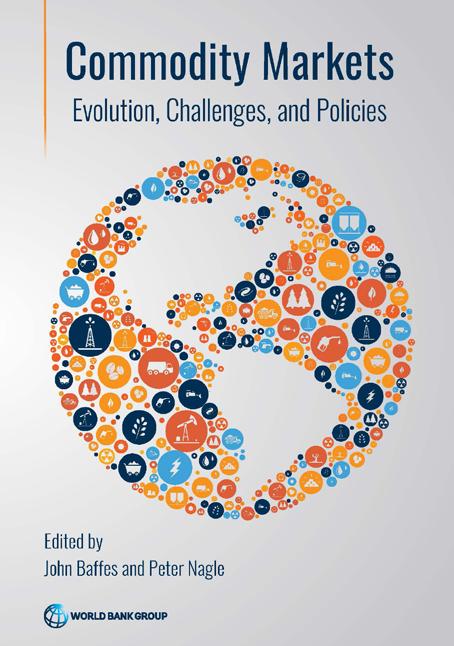 Edited by John Baffes and Peter Nagle
Edited by John Baffes and Peter Nagle
Commodity markets are integral to the global economy. Understanding what drives developments of these markets is critical to the design of policy frameworks that facilitate the economic objectives of sustainable growth, inflation stability, poverty reduction, food security, and the mitigation of climate change. This study is the first comprehensive analysis examining market and policy developments for all commodity groups, including energy, metals, and agriculture, over the past century. It finds that, while the quantity of commodities consumed has risen enormously, driven by population and income growth, the relative importance of commodities has shifted over time, as technological innovation created new uses for some materials and facilitated substitution among commodities. The study also shows that commodity markets are heterogeneous in terms of their drivers, price behavior, and macroeconomic impact on emerging markets and developing economies, and that the relationship between economic growth and commodity demand varies widely across countries, depending on their stage of economic development. Policy frameworks that enable countercyclical macroeconomic responses have become increasingly common—and beneficial. Other policy tools have had mixed outcomes.
18 www.worldbank.org/publications • books@worldbank.org WORLD BANK PUBLICATIONS AND ePRODUCTS FEATURED TITLES
2022. 292 pages. Stock
December
no. C211911 (ISBN: 978-1-4648-1911-7). US$54.95
THE GOVERNMENT ANALYTICS HANDBOOK
Leveraging Data to Strengthen Public Administration
Edited by Daniel Rogger and Christian Schuster
The Government Analytics Handbook presents frontier evidence and practitioner insights on how to leverage data to strengthen public administration. The handbook covers the use of administrative data, public servant surveys, and other microdata to diagnose and improve how public organizations work.

Overview chapters lay out the motivation for government analytics, summarize key lessons from the book on how to do government analytics well, and offer an approach for the future of government data. Four online modules are included to provide in-depth guidance on key themes:
Module 1: Foundational Themes in Government Analytics
Module 2: Government Analytics Using Administrative Data
Module 3: Government Analytics Using Public Servant Surveys
Module 4: Government Analytics Using External Assessments
The Government Analytics Handbook includes tools and resources for undertaking recommended analytics, enabling readers to immediately apply insights from the handbook.
WORKING WITH SMALLHOLDERS
A Handbook for Firms Building Sustainable Supply Chains, Third Edition
 By International Finance Corporation
By International Finance Corporation
The Working with Smallholders handbook aims to enable the development of more sustainable, resilient, and productive agribusiness supply chains and to illustrate their developmental impact. Smallholder farmers present both opportunities and challenge for agribusinesses. The predominance of smallholders in many frontier and emerging markets makes them an integral part of agribusiness supply chains.
This handbook compiles innovative solutions to these challenges, incorporating case studies from across diverse regions and agribusiness sectors. The third edition incorporates new developments and areas of interest since the last publication, including the growing predominance of digital technologies and increasing concerns around sustainability.
June 2023. 100 pages plus four online modules
Stock no. C211957 (ISBN: 978-1-4648-1957-5). US$43.95
April 2023. 324 pages. Stock no. C211962 (ISBN: 978-1-4648-1962-9). US$54.95
phone +1 (703) 661 1580 • in the U.S. phone +1 (800) 645 7247 • fax +1 (703) 661 1501
19
WORLD BANK PUBLICATIONS AND ePRODUCTS FEATURED TITLES
SILVER OPPORTUNITY
Building Integrated Services for Older Adults around Primary Health Care
Edited by Xiaohui Hou, Jigyasa Sharma, and Feng Zhao
We live in a rapidly aging world, in which people who are 60 years and older outnumber children under the age of five. This book reveals large and growing gaps in care for older adults in countries at all income levels and shows how to leverage reforms for improving health outcomes for older adults and creating healthier, more prosperous communities.
April 2023. 250 pages.
Stock no. C211958 (ISBN: 978-1-4648-1958-2). US$49.95
PRIVATE CITIES

Aimed at policy makers and other health and development stakeholders who want to promote healthier aging, Silver Opportunity compiles the latest evidence on care needs and gaps for aging populations. It argues that primary health care (PHC) should be the cornerstone of integrated service delivery for older people, but that PHC systems must first build their capacity to respond to older people's health needs. It presents an original framework for policy action to advance PHC-centered, integrated senior care; documents the experiences of pioneering countries in delivering community-based care to older people; and provides recommendations for decision-makers. The framework presents four policy levers to improve health care for seniors—financing, innovation, regulation, and evaluation and measurement—or FIRE. Finally, the book posits that by acting now, countries can leverage population aging to accelerate progress toward health equity and Universal Health Coverage (UHC).

Outstanding Examples from Developing Countries and Their Implications for Urban Policy
By Yue Li and Martin Rama
Institutional constraints and weak capacity often hamper the ability of local governments in developing countries to steer urbanization. As a result, there are not enough cities to accommodate an unabated rural-urban migration, and many of the cities that emerge are sprawling and disconnected. The flipside is the emergence of entire cities—more than gated communities or industrial parks—led in whole or in part by private actors. To date, little systematic research has been conducted on the conditions that are necessary for such unusual entities to emerge, on the roles played by private actors, or on the consequences for efficiency and equity. Private Cities: Outstanding Examples from Developing Countries and Their Implications for Urban Policy aims to fill this gap. Using an analytical framework that draws on urban economics and political science, it includes inventories of private cities in the Arab Republic of Egypt, India, Indonesia, and Pakistan and provides structured reviews of 14 outstanding examples across all developing regions.
URBAN DEVELOPMENT
April 2023. 264 pages. Stock no. C211833 (ISBN: 978-1-4648-1833-2). US$49.50
20 www.worldbank.org/publications •
WORLD BANK PUBLICATIONS AND ePRODUCTS FEATURED TITLES
books@worldbank.org
AFRICA'S RESOURCE FUTURE
Harnessing Oil, Gas, and Minerals for Economic Transformation during the Low Carbon Transition
Edited by Albert Zeufack and James Cust
This book examines the role for natural resource wealth in driving Africa's economic transformation and the implications of the low-carbon transition for resource-rich economies. Resource wealth remains central to most Sub-Saharan African economies, and significant untapped potential is in the ground. Subsoil assets—such as metals, minerals, oil, and gas—are key sources of government revenues, export earnings, and development potential in most countries in the region. Despite large reserves, success in converting subsoil wealth into aboveground sustainable prosperity has been limited. Since the decline in commodity prices in 2014, resource-rich Africa has grown more slowly than the region's average growth rate. Finding ways to more effectively harness natural resource wealth to drive economic transformation will be central to Africa's economic future.

As the world moves away from fossil fuels in alignment with commitments under the Paris Agreement, Africa's resource-rich countries face new risks and opportunities. Recent estimates suggest that 80 percent of the world's proven fossil fuel reserves must remain underground to meet the Paris targets, and much of these stranded reserves may be in Africa. The transition from fossil fuels to clean energy may create demand by 2050 for 3 billion tons of minerals and metals that are needed to deploy solar, wind, and geothermal energy. Africa's Resource Future explores these themes and offers policy makers insights to help them navigate the coming years of uncertainty.
AFRICA DEVELOPMENT FORUM
February 2023. 200 pages. Stock no. C211743 (ISBN: 978-1-4648-1743-4). US$48.50
MIGRANTS, MARKETS, AND MAYORS
Rising above the Employment Challenge in Africa's Secondary Cities
Edited by Luc Christiaensen and Nancy Lozano
In our rapidly urbanizing world, mayors often see migrants as a burden to their cities' labor markets and a threat to their development. Drawing on national household surveys and four secondary city case studies in Africa, this report finds that migrants— being younger, better educated, and complementary to the resident labor force—can strengthen the urban labor force.
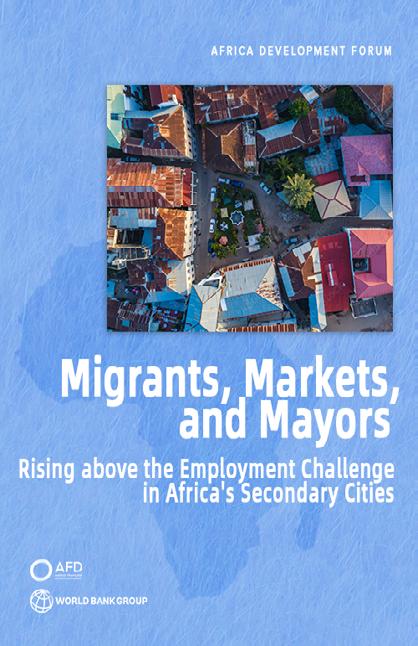
Labor market outcomes for migrants generally are at least as good as those for residents. Migrants also contribute increasingly less to urban population growth. Secondary cities and towns appear particularly well placed to leverage migration if they have good urban management that develops land and labor markets, prepares for growth, and benefits everyone, migrants as well as residents. Migrant-specific interventions are warranted when divisions between native populations and migrants are deep. Strengthening the financial, technical, and planning capacity of towns and secondary cities to better integrate migrants is part and parcel of the good jobs agenda.
AFRICA DEVELOPMENT FORUM
April 2023. 180 pages. Stock no. C211903 (ISBN: 978-1-4648-1903-2). US$43.95
21 phone +1 (703) 661 1580 • in the U.S. phone +1 (800) 645 7247 • fax +1 (703) 661 1501
WORLD BANK PUBLICATIONS AND ePRODUCTS AFRICA
COMMONS
Drivers of Change and Opportunities for Sub-Saharan Africa
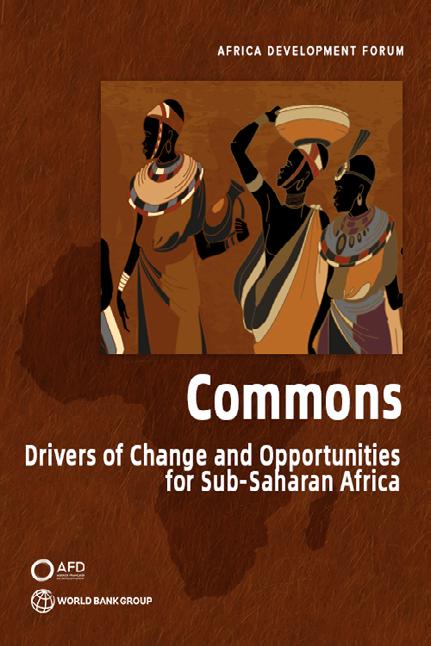 Edited by Kako Nubukpo, Lola Mercier, Mathieu Boche, Benjamin Coriat, and Stéphanie Leyronas
Edited by Kako Nubukpo, Lola Mercier, Mathieu Boche, Benjamin Coriat, and Stéphanie Leyronas
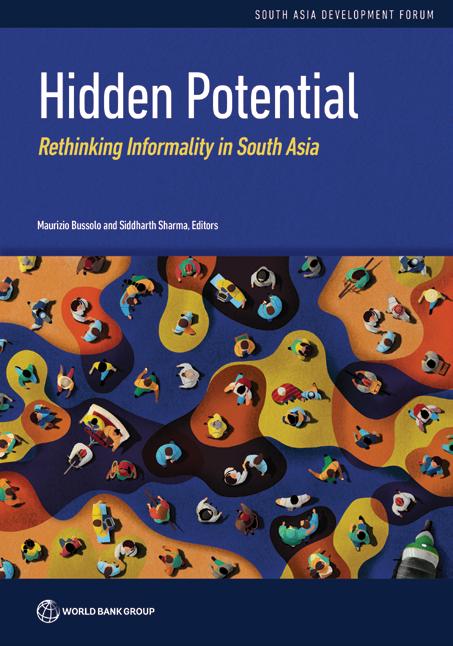
This study focuses on forms of commons-based entrepreneurship in Sub-Saharan Africa that have developed in response to issues ranging from land and natural resources management to public services, employment and training, climate change, and biodiversity. It sheds new light on the range of possible arrangements between communities involved in managing the commons and the central, devolved, or local state services. Finally, it proposes a renewed agenda for international cooperation, as well as a set of principles for sustainable and effective support for the commons in Africa.
Authored by the Agence française de développement (AFD), this publication is a new title in the Africa Development Forum, a series copublished by the AFD and the World Bank.
AFRICA DEVELOPMENT FORUM
May 2023. 220 pages.
Stock no. C211960 (ISBN: 978-1-4648-1960-5). US$49.50
HIDDEN POTENTIAL
Rethinking Informality in South Asia
Edited by Maurizio Bussolo and Siddharth Sharma
Informality remains widespread in South Asia despite decades of economic growth. The low earnings and high vulnerability in the informal sector make this a major development issue for the region. Yet, there is no consensus on its causes and consequences, with the debate polarized between a view that informality is a problem of regulatory evasion and should be eradicated, and another that equates informality with economic exclusion.
Recent advances in analyzing informality as the outcome of firm dynamics in distorted economic environments can help reconcile them. Building on these advances, the approach adopted in this volume clarifies that there are different types of informality, with different drivers and consequences.
SOUTH ASIA DEVELOPMENT
FORUM
January 2023. 354 pages.
Stock no. C211834 (ISBN: 978-1-4648-1834-9). US$43.95
The report has four main messages that underscore the need for a multipronged strategy. First, informality in South Asia is dominated by firms that happen to be outside the purview of regulations because they are small, as opposed to those that remain small to escape regulations. Second, reforms of business regulations tend to have small direct effects on the informal sector, although they could have sizable indirect impacts on it if they succeed in removing major inefficiencies in the broader economy. Third, e-commerce platforms offer new opportunities to informal firms and workers, but many of them lack complementary skills or credit to benefit from such technologies. Fourth, a combination of contributory and non-contributory programs recognizing the heterogenous saving capacities of informal workers may be necessary to achieve more universal coverage of social insurance.
22 www.worldbank.org/publications • books@worldbank.org WORLD BANK PUBLICATIONS AND ePRODUCTS AFRICA AND SOUTH ASIA
REIMAGINING EDUCATION IN EAST ASIA AND PACIFIC IN THE
WAKE OF THE COVID-19 PANDEMIC
 By the World Bank
By the World Bank
Countries in middle-income East Asia and Pacific were already experiencing a learning crisis prior to the COVID-19 pandemic. COVID-related school disruptions have only made things worse. Learning poverty—defined as the percentage of 10-year-olds who cannot read and understand an age-appropriate text—is as high as 90 percent in several countries. Several large Southeast Asian countries consistently perform well below expectations on adolescent learning assessments.
This report examines several key factors affecting learning outcomes in the region, including teaching, the use of educational technologies (EdTech), and public spending on education. It also analyzes the political economy of education reform and presents recommendations on how countries in middle-income East Asia and Pacific can recover COVID-related learning losses and build stronger education systems to enhance productivity, growth, and development in the region.
February 2023. 150 pages. Stock no. C211904 (ISBN: 978-1-4648-1904-9). US$43.95
INNOVATIVE KOREA
Lessons on Leveraging Innovation and Technology for Development
Edited by Anwar Aridi, Youngsun Koh, and Hoon Sahib Soh
The Republic of Korea today is a highly industrialized, global innovation and technology leader. It is the twelfth largest economy in the world, with a per capita income at the average of OECD countries. However, in the 1950s, it was one of the poorest countries in the world, with decidedly bleak prospects, making Korea a well-known case study of successful development.
Innovative Korea summarizes the sources of Korea's remarkable growth performance and the policies and institutional reforms that made this possible. In particular, the report focuses on Korea's successful transition from a middle-income to a high-income economy and how it escaped the "middle-income trap" by fundamentally transforming its growth model in response to the Asian Financial Crisis of 1997-98, moving toward a more private-sector-led model with greater emphasis on market competition, innovation, and technology. Instead of targeting large firms and industries, industrial policies prioritized small and medium enterprises and technology entrepreneurs. Exports expanded significantly through greater integration in global value chains. Already high levels of human capital development were complemented by an expanded social safety net and a more integrated approach to education and training.
23 phone +1 (703) 661 1580 • in the U.S. phone +1 (800) 645 7247 • fax +1 (703) 661 1501

WORLD BANK PUBLICATIONS AND ePRODUCTS EAST ASIA AND PACIFIC
June 2023. 400 pages. Stock no. C211961 (ISBN: 978-1-4648-1961-2). US$60.50
A BALANCING ACT FOR BRAZIL'S AMAZONIAN STATES
An Economic Memorandum
Edited by Marek Hanusch
Social deprivations coincide with vast deforestation in Brazil's Legal Amazon, or Amazonia. Poverty reduction and sustainable development require renewed efforts to protect the region's exceptional natural wealth, coupled with a shift from an extractive to a productivity-oriented growth model.
INTERNATIONAL DEVELOPMENT IN FOCUS
February 2023. 328 pages. Stock no. C211909 (ISBN: 978-1-4648-1909-4). US$52.95.
ALSO AVAILABE IN PORTUGUESE
February 2023. 388 pages. Stock no. C211913 (ISBN: 978-1-4648-1913-1). US$52.95.
AIR POLLUTION AND CLIMATE CHANGE
From Co-Benefits to Coherent Policies
By Grzegorz Peszko, Markus Amann, Yewande Awe, Gary Kleiman, and Tamer Samah Rabie
While many countries pledge to phase out fossil fuels in 30-40 years, 6-7 million people die each year from air pollution. This report shows how to design coherent policies that harness synergies and manage tensions between air quality and climate mitigation and that put people's health first while paving the way for long-term decarbonization.
INTERNATIONAL DEVELOPMENT IN FOCUS
January 2023. 132 pages. Stock no. C211835 (ISBN: 978-1-4648-1835-6). US$41.95.
BOOSTING PRODUCTIVITY IN KAZAKHSTAN WITH MICRO-LEVEL TOOLS Analysis and Policy Lessons
By Mariana Iootty, Asset Bizhan, and Paulo
Correa
This report examines the causes of low productivity growth in Kazakhstan by combining an analysis of firm-level data and multiple policy drivers. It is the first work to analyze the micro-foundations of the total factor productivity in Kazakhstan and elaborate on specific recommendations for boosting aggregate productivity growth.
INTERNATIONAL DEVELOPMENT IN FOCUS
January 2023. 92 pages. Stock no. C211910 (ISBN: 978-1-4648-1910-0). US$35.
BREATHING HEAVY New Evidence on Air Pollution and Health in Bangladesh
By Wameq Azfar Raza, Iffat Mahmud, and Tamer Samah Rabie
Using data on health conditions and exposure to air pollution at the individual level from Bangladesh, this book establishes a positive association between air pollution and health risks, including mental health issues, and recommends policy options for better adaptation.
INTERNATIONAL DEVELOPMENT IN FOCUS December 2022. 96 pages. Stock no. C211919 (ISBN: 978-1-4648-1919-3). US$35.
RISING FROM THE DEPTHS Water Security and Fragility in South Sudan
By Edoardo Borgomeo, Claire Chase, Nicolas Salazar Godoy, and Victor Osei Kwadwo South Sudan is the third most vulnerable country to climate change in the world and one of the most politically fragile. This report illustrates how South Sudan can leverage its water resources to prepare for climate change and advance national peace and development.
INTERNATIONAL DEVELOPMENT IN FOCUS March 2023. 178 pages. Stock no. C211943 (ISBN: 978-1-4648-1943-8). US$41.95.
THE LONG ROAD TO INCLUSIVE INSTITUTIONS IN LIBYA
A Sourcebook of Challenges and Needs
Edited by Hend R. Irhiam, Michael G. Schaeffer, and Kanae Watanabe
This sourcebook compiles analytical work that has been cultivated over the past several years by the World Bank and partner organizations of Libya. Utilizing several analytical techniques, the book makes a unique contribution to the discussion on Libya's mediumto long-term challenges.
INTERNATIONAL DEVELOPMENT IN FOCUS March 2023. 470 pages. Stock no. C211922 (ISBN: 978-1-4648-1922-3). US$57.50.
24 www.worldbank.org/publications • books@worldbank.org WORLD BANK PUBLICATIONS AND ePRODUCTS INTERNATIONAL DEVELOPMENT IN FOCUS
GOVERNMENT TOOLKIT FOR PLANNING NATIONAL TELEMEDICINE AND HEALTH HOTLINE SERVICES
By the World Bank
This toolkit outlines the multi-phased approach needed to set up a health hotline or telemedicine service at a national scale, while also providing tools that can be used to, for example, cost out and design the system, contract service providers, and/or engage mobile network operators.
INTERNATIONAL DEVELOPMENT IN PRACTICE
March 2023. 100 pages. Stock no. C211955 (ISBN: 978-1-4648-1955-1). US$41.95.
SERVICE PROVIDER TOOLKIT FOR PLANNING NATIONAL TELEMEDICINE AND HEALTH HOTLINE SERVICES
By the World Bank
A toolkit for service providers, working with governments, who are interested in helping establish national telemedicine or health hotline services, including center service providers, teleconferencing software providers, data centers/hosting providers, voice response providers, hotline/reference software providers, software support service providers, and mobile network operators.
INTERNATIONAL DEVELOPMENT IN PRACTICE March 2023. 94 pages. Stock no. C211956 (ISBN: 978-1-4648-1956-8). US$35.
BOOSTING SHARED PROSPERITY IN CHAD (FRENCH EDITION)
Pathways Forward in a Landlocked Country Beset by Fragility and Conflict
By Fulbert Tchana Tchana, Aboudrahyme Savadogo, and Claudia Noumedem Temgoua
Chad's economy has contracted since 2015, preventing poverty reduction and the improvement of development outcomes. This Systematic Country Diagnostic identifies key constraints on poverty reduction and recommends solutions.
SYSTEMATIC COUNTRY DIAGNOSTIC
February 2023. 120 pages. Stock no. C211887 (ISBN: 978-1-4648-1887-5). US$41.95.
READ MORE IN THE SERIES:
INTERNATIONAL DEVELOPMENT IN FOCUS
The International Development in Focus series comprises original, well-developed studies that highlight current development issues and are intended to influence programs and policy. These books result from research and analysis conducted as part of the World Bank’s operational work around the world.
INTERNATIONAL DEVELOPMENT IN PRACTICE
Books in the International Development in Practice series provide quality, practical (“how to”) guidance that can be applied by practitioners in the development arena. These books draw on experience and analysis gleaned from the World Bank’s operational work.
SYSTEMATIC COUNTRY DIAGNOSTIC
Books in the Systematic Country Diagnostic (SCD) series result from the SCD process, which is conducted by World Bank Group staff in close consultation with national authorities and other stakeholders. SCDs identify the most critical constraints and opportunities facing countries as they work to end extreme poverty and promote shared prosperity in a sustainable manner.
25 phone +1 (703) 661 1580 • in the U.S. phone +1 (800) 645 7247 • fax +1 (703) 661 1501
WORLD BANK PUBLICATIONS AND ePRODUCTS INTERNATIONAL DEVELOPMENT IN PRACTICE SYSTEMATIC COUNTRY DIAGNOSTIC
WORLD BANK ELIBRARY
elibrary.worldbank.org
World Bank eLibrary is a subscription-based platform designed to meet the unique needs of students, researchers, and librarians.
eLibrary contains the complete collection of all World Bank books, working papers, and journal articles since the 1990s. Topics cover a broad range of social and economic development issues, including COVID-19, climate change, development policy, finance, health, education, and poverty reduction.

Benefits for users
New, single-sign-on system for accessing and managing accounts across multiple participating websites
eReader with responsive layout
Updated World Development Indicators for countries and regions
Books in PDF and ePub, plus chapter-level access and full text for most recent titles
Full-text and metadata-based search
Multiple browse and filtering options for more precise results
eAlerts based on content preferences or search criteria
Language filter and selected titles in French and Spanish
Benefits for libraries and administrators:
Indexing in popular library search and discovery services
Free downloadable MARC records, metadata, and KBART holdings
Self-service account management, including COUNTER 4-compliant usage reports
Library branding
Authentication via IP, Athens, and Shibboleth
For more information, visit elibrary.worldbank.org or email onlineresources@worldbank.org.
REQUEST A FREE TRIAL TODAY!
"Any library, public or academic, with patrons who have a need to research the most current news, economics, and business trends from around the world would greatly benefit from The World Bank eLibrary."
— Against the Grain
Free trials are available for institutions. To request a free trial or a price quote, please contact your preferred eLibrary sales agent or contact customer service at onlineresources@worldbank.org.
26 www.worldbank.org/publications •
WORLD BANK PUBLICATIONS AND ePRODUCTS ONLINE RESOURCES
books@worldbank.org
For free trials, quotes, or additional information on the World Bank eLibrary, please contact your preferred sales agent or library consortium. You may also contact customer service directly at onlineresources@worldbank.org.
AFRICA
BOTSWANA, SOUTH AFRICA
WorldWide Information Services
South Africa
Tel: (+2711) 789-9947 Fax: (+2711) 789-9967 info@wwis.co.za www.wwis.co.za
MIDDLE EAST & NORTH AFRICA
EGYPT, KUWAIT, QATAR, SAUDI ARABIA, SUDAN, UNITED ARAB EMIRATES
Middle East Readers Information Center (MERIC)
Heliopolis, Cairo, Egypt Tel: +202 22677018 Fax: +202 22677016 subscriptions@mericonline .com www.mericonline.com
ISRAEL
Teldan PO Box 18094 61180 Tel Aviv Tel: 972-3-611 7500 Fax: 972-3-611 7501 sales@teldan.com www.teldan.com
WESTERN EUROPE
BELGIUM, LUXEMBOURG
Jean De Lannoy c/o Michot Entrepôts Sint Pieters Leeuw Tel: +32 2 538 43 08/+32 477 455 329 Fax: +32 2 538 08 41/+32 2 706 52 27
Jean.de.lannoy@dl-servi .com www.jean-de-lannoy.be
UNITED KINGDOM
Databeuro Limited PO Box 419
Flitwick, Bedfordshire MK45 1ZP
Tel: +44 0 1525 752 689 Fax: +44 0 1525 752 690 sales@databeuro.com
EUROPE & CENTRAL
ASIA
CZECH REPUBLIC, SLOVAK REPUBLIC
Albertina icome Bratislava s.r.o. Slovak Republic Office, Bratislava Tel: +421 2 529 324 50 lucia.polednikova@aip.cz
www.aib.sk/en Czech Republic Office, Praha Tel: +420 222 231 212 Jiri.Kadlecek@aip.cz www.aip.cz
RUSSIAN FEDERATION
NEICON
4 ul. Letnikovskaya, office 2.4/ building 5 115114 Moscow, Russia Tel: +7 499 754 9994 Darya Sharomet sharomet@neicon.ru https://neicon.ru/
Metec Ltd. Moscow Tel: (495) 510 5520 Fax: (495) 510 5527 elena_m@metecbooks.ru www.konekbooks.ru
Ves Mir Publishers Moscow Tel: +7-495-632-47-04 dyadyunova@vesmirbooks .ru www.vesmirbooks.ru/en/ Türkiye Gemini Tel: +90 216 464 33 00 – 04 (Istanbul) Fax: +90 216 464 32 50 (Istanbul) Tel: + 90 312 441 29 96 (Ankara) bilgi@geminiltd.com.tr www.geminibilgi.com.tr
SOUTH ASIA
INDIA
Allied Publishers Mumbai
Tel: +91 (22) 4212 6930 Fax: +91 (22) 2261 7928 arjunsachdev@ alliedpublishers.com www.alliedpublishers.com
Anand Associates Mumbai Mr. Jayaram Hegde thrupti123@gmail.com
Total Library Solutions
New Delhi Tel: +91-11-2583-2289 Fax: +91-11-2583-1779 jyoti@tlsindia.com www.tlsgroup.co.in
Viva Books Private Limited New Delhi
Tel: 91 11 42242255 Fax: 91 11 42242240 Pradeep@vivagroupindia .net www.vivagroupindia.com
EAST ASIA & PACIFIC
CAMBODIA; HONG KONG SAR, CHINA; INDONESIA; REPUBLIC OF KOREA; LAO PDR; MALAYSIA; PHILIPPINES; SINGAPORE; TAIWAN, CHINA; THAILAND; VIETNAM Kelvin Poh keltmpoh@gmail.com
CHINA
Charlesworth China Chaoyang District, Beijing Tel: +86 (10) 87521277 Fax: +86 (0)10 67799806 Ext.200 nopoo_li@charlesworth. com.cn www.charlesworth.com.cn
China International Book Trading Corporation Electronic Products Department Beijing Tel: 8610 68433142 Fax: 8610 68416126 cbic4@mail.cibtc.com.cn www.cibtc.com.cn
HONG KONG SAR, CHINA
Info Access & Distribution Ltd (iGroup Hong Kong) Kowloon, Hong Kong SAR, CHINA Tel: +852 2572 7228 Fax: +852 2575 8822 info.hk@igroupnet.com www.infoaccess.com.hk
JAPAN
Far Eastern Booksellers/Kyokuto Shoten Tokyo Tel: +0081-3-3265-7532 Fax: +0081-3-3265-4656 import.div@kyokuto-bk .co.jp www.kyokuto-bk.co.jp
Kinokuniya Publications Service Tokyo
Tel: 81 3 6910 0532 Fax: 81 3 6420 1363 david@kinokuniya.com www.kinokuniya.co.jp
Maruzen-Yushodo Co., Ltd. Tokyo
Tel: 81-3-6367-6114 Fax: 81-3-6367-6184 takahiro.mitani@maruzen .co.jp www.yushodo.maruzen.co.jp
REPUBLIC OF KOREA
JRM Co., LTD Seoul
Tel: +82-2-2038-8519 Fax: +82-2-2038-8528 hykim@camko.co www.jrmkorea.co.kr
MALAYSIA
Access Dunia Sdn. Bhd. (iGroup Malaysia) Shah Alam, Selangor Tel: +603 55691379 Fax: +603 55691459 susan@accessdunia.com.my www.accessdunia.com.my
PHILIPPINES
CE-Logic, Inc. Quezon City Tel: +63 977-093-2076 jeffrey.merana@ce-logic .com www.ce-logic.com
SINGAPORE
InfoHost Pte Ltd (iGroup Singapore) Tel: +65 6741 8422 Fax: +65 6741 8821 info.sg@igroupnet.com www.infohost.com.sg
TAIWAN, CHINA iGroup Taiwan Da-an District, Taipei City Tel: +886 2 27078588 Fax: +886 2 27078955 tracy.huang@igrouptaiwan .com www.igroup.com.tw
THAILAND
Book Promotion & Service Ltd. (iGroup Thailand) Bangkok Tel: +66 2 7693888 Fax: +66 2 3795182 ratthsith@book.co.th www.book.co.th
VIETNAM
IDT Vietnam Ha Noi Nguyen Thi Anh (Ms.) Tel: +844- 6291-1401 Fax: +844-3641-7852 anhnt@idtvietnam.vn www.idtvietnam.vn/en
AUSTRALASIA
AUSTRALIA, NEW
ZEALAND
About3 Learning P/L. A5/5 Janine Street, Scoresby, VIC, 3179 Australia
Tel: +61 3 9495 7663 enquiries@about3.com.au
LATIN AMERICA & THE CARIBBEAN
COLOMBIA
Infolink Colombia Carlos Alberto Rivas Bogotá D.C. Tel: +57 (1) 630 63 89 carlos.rivas@ infolinkcolombia.com.co www.infolinkcolombia.com.co
NORTH AMERICA
CANADA, UNITED STATES
Renouf Publishing Company Ltd Ogdensburg, New York
Tel: +1 888 551-7470 Fax: +1 888 568-8546 orders@renoufbooks.com www.renoufbooks.com
UNITED STATES
National Book Network/Bernan Press Guilford, CT 06437 Tel: +1 203-458-4500, ext. 4552 ajacobs@nbnbooks.com http://nbnbooks.com/
27 phone +1 (703) 661 1580 • in the U.S. phone +1 (800) 645 7247 • fax +1 (703) 661 1501
WORLD BANK PUBLICATIONS AND ePRODUCTS
WORLD BANK ELIBRARY SALES AGENTS
A Balancing Act for Brazil's Amazonian States 24
Africa's Resource Future ...............................................21
Air Pollution and Climate Change ................................ 24
Ambient Air Pollution and Public Health in South Asia 13
Boosting Productivity in Kazakhstan with Micro-Level Tools 24
Breathing Heavy .......................................................... 24 Collapse and Recovery .................................................. 3
Commodity Markets 18
Commons 22 Detox Development ....................................................... 4
Digital Africa .................................................................. 9
Fintech and the Future of Finance 17
Global Economic Prospects, January 2023 2
Global Economic Prospects, June 2023 ........................ 2
Government Toolkit for Planning National Telemedicine and Health Hotline Services in Low- and Middle-Income Countries ..................................................................... 24
Hidden Potential 22
Innovative Korea 23
International Debt Report 2022 ................................... 15
Jobs Undone ................................................................. 14 Land Matters 10
La terre en question 10 Migrants, Markets, and Mayors ....................................21 Misallocation of Firm Financing .................................... 17
Nature's Frontiers 16
Off the Books ................................................................. 6 Private Cities ................................................................ 20
Productivity through a Spatial Lens ..............................12
Promouvoir une prospérité partagée au Tchad 25
Reimagining Education in East Asia and Pacific in the Wake of the COVID-19 Pandemic 23
Request a free trial today! 26
Rising from the Depths 24
Service Provider Toolkit for Planning National Telemedicine and Health Hotline Services in Low- and Middle-Income Countries 24 Silver Opportunity ........................................................ 20 Social Sustainability in Development ............................18
The Economics of Electric Vehicles for Passenger Transportation ............................................................... 7
The Economics of Water Scarcity in the Middle East and North Africa ................................................................... 11
The Government Analytics Handbook 19
The Long Road to Inclusive Institutions in Libya 24
The Path to 5G in the Developing World 8
The Political Economy of Climate Action ...................... 16 Thriving .......................................................................... 5
Women, Business and the Law 2023 ........................... 15
Working with Smallholders 19
World Bank eLibrary 26 World Development Report 2023 1
28 www.worldbank.org/publications
WORLD BANK PUBLICATIONS AND ePRODUCTS INDEX
• books@worldbank.org
EUROPE, AFRICA, MIDDLE EAST & EAST ASIA, AUSTRALASIA
PRINCIPAL DISTRIBUTOR
Eurospan
Gray’s Inn House 127 Clerkenwell Road, Lodon, EC1R 5DB United Kingdom info@eurospan.co.uk www.eurospan.co.uk
Trade Orders & Enquiries: Tel. +44 (0) 1235 465576 trade.orders@marston.co.uk
Individual Orders: www.eurospanbookstore.com /world-bank
EUROPE, UK, & REPUBLIC OF IRELAND
Sales Representative
Phil Prestianni Sales Manager, UK & Republic of Ireland Eurospan phil.prestianni@eurospan .co.uk
Sales Agents and Booksellers
Dandy Booksellers Tel. +44 (0) 2076242993 enquiries@dandybooksellers .com www.dandybooksellers.com
Dawson Tel. +44 (0) 1933417500 nasser.lassoued@ dawsonbooks.co.uk www.dawsonbooks.co.uk
The Stationery Office Tel. +44 (0) 8706005522 customer.services@tso.co.uk www.tso.co.uk
NORDIC COUNTRIES
Sales Representative
David Towle david@dti.a.se
Sales Agents and Booksellers
NORWAY
Akademika A/S Tel. +47 (0) 22188100 kundeservice@akademika.no www.akademika.no
SWEDEN
Bokus
Tel. +46 (1) 07441047 elin.karlsson@bokus.com www.bokus.com
WESTERN EUROPE
Sales Representative
Michelle Zappa (Austria, Belgium, France, Germany, Italy, Luxembourg, Netherlands, Portugal, Spain, Switzerland) michelle.zappa@ eurospan.co.uk
Sales Agents and Booksellers
BELGIUM
DL Services Tel. +32 (0) 25384308 jean.de.lannoy@dl-servi.com www.jean-de-lannoy.be
GERMANY & AUSTRIA
Massmann International Buchhandlung Tel. +49 (4) 076700418 kay.massmann@massmann .de www.massmann.de
Missing Link
Versandbuchhandlung Tel. +49 (4) 21504348 info@missing-link.de www.missing-link.de
Planetis Tel. +41 (0) 223665177 info@planetis.ch www.planetis.ch
ITALY
Casalini Libri s.p.a. Tel. +39 (0) 5550181 orders@casalini.it www.casalini.it
PORTUGAL
Omniserviços Tel. +351 21 754 01 91 comercial@omniservicos.pt www.omniservicos.pt
SPAIN
Libreria Delsa Tel. +914 (3) 57421 delsa@troa.es
Alibri Llibreria SL Tel. +34 93 317 05 78 alibri@alibri.es www.alibri.es
SWITZERLAND
Planetis Tel. +41 (0) 223665177 info@planetis.ch www.planetis.ch
EASTERN EUROPE
Sales Representative
Jacek Lewinson Tel. +48 502603290 jacek@jaceklewinson.com
MIDDLE EAST &
NORTH AFRICA
Sales Representatives
International Publishers
Representatives Tel. +357 (0) 22872355 info@ipr-pub.com
Sales Agents and Booksellers EGYPT
Middle East Readers’ Information Center (MERIC) Tel. +20 (2) 22681640 info@mericonline.com www.mericonline.com
MOROCCO
La Librairie Internationale Tel. +212 (0) 5680329 Fax. +212 (0) 5770914 cclibinter@menara.ma
SUB-SAHARAN AFRICA
Sales Representative
Guy Simpson Africa Connection guy.simpson@ africaconnection.co.uk
Sales Agents and Booksellers
Mallory International Limited (UK) Tel. +44 (0) 1395239199 julian@malloryint.co.uk www.malloryint.co.uk
NIGERIA Citrax Tel: +234 8022243515 info@citraxcompany.com
TANZANIA
Matthews Books and Stationery Tel. +255 (0) 222861281 ipyanam@yahoo.com
SOUTHERN AFRICA
Sales Representative
Guy Simpson Africa Connection guy.simpson@ africaconnection.co.uk
Sales Agents and Booksellers
BOTSWANA
Botsalo Books Tel. +267 (0) 3912576 botsalobooks@botsnet.bw
SOUTH AFRICA
Van Schaik Boekhandel Tel. +27 (0) 219188437 vsorders@vanschaik.com www.vanschaik.com
EAST ASIA
REPUBLIC OF KOREA
PRINCIPAL DISTRIBUTOR
Korean Studies Information Co., Ltd. Tel. +82-31-940-1173 wb@kstudy.com http://wb.booktory.com
JAPAN
Far Eastern Booksellers Tel : 81-3-3265-7532 Fax : 81-3-3265-4656 info@kyokuto-bk.co.jp www.kyokuto-bk.co.jp
Sales Agents and Booksellers
CHINA; HONG KONG, SAR, CHINA; TAIWAN, CHINA China Publishers Marketing Tel. +86 2154259557 benjamin.pan@cpmarketing .com.cn
BRUNEI, MALAYSIA, SINGAPORE
PMS Publishers Services Pte Ltd Tel. +65 62565166 raymondlim@pms.com.sg
CAMBODIA, EAST TIMOR, INDONESIA, LAO PDR, MYANMAR, PHILIPPINES, THAILAND, VIETNAM
Alkem Company (Singapore) Pte Ltd Tel. +65 62656666 Fax. +65 62617875 enquiry@alkem.com.sg
CENTRAL ASIA
AFGHANISTAN, AZERBAIJAN, KAZAKHSTAN, KYRGYZSTAN, TAJIKISTAN, TURKMENISTAN, UZBEKISTAN
Sales Representative Marc Bedwell Regional Manager, Asia-Pacific & Latin America Eurospan Tel. +44 (0) 2078450811 Fax. +44 (0) 2073790609 marc.bedwell@eurospan .co.uk
SOUTH ASIA
INDIA
PRINCIPAL DISTRIBUTOR
Viva Books Pvt Ltd 4737/23 Ansari Road Daryaganj New Delhi-110002
Tel: + 91-11- 42242200 Fax: + 91-11-42242240 vivadelhi@vivagroupindia.net
BANGLADESH
Micro Industries Development Assistance and Services (MIDAS) Tel: +880-2-8116094-5 midas@aitlbd.net
NEPAL
Everest Media International Services (P.) Ltd. Tel: +977-1-4417048 emispltd@wlink.com.np
Bazaar
Tel: 977-1-4427098, sales@bazaarint.com
PAKISTAN
Pak Book Corporation Tel: +92-42-6363222; 6360885 pbc@brain.net.pk
SRI LANKA
Marga Institute Tel: 94-11-2888790/1 nfernando@margasrilanka .org
AUSTRALIA & NEW ZEALAND
Sales Agent and Bookseller Eurospan C/o XL Express Logistics Tel: +61 (0) 2 8778 9999 orders.logistics@xlexpress. com.au
LATIN AMERICA AND THE CARIBBEAN MEXICO
Valher Promociones y Representaciones Tel: +52-55 5613 1293 valherpyr@prodigy.net.mx
TRINIDAD & TOBAGO AND THE CARIBBEAN
Systematics Studies Ltd. Tel: +868-645-8466 systematicsssl@flowtrinidad .com
NORTH AMERICA
CANADA
Renouf Publishing Co. Ltd. Tel: +613-7452665 order.dept@renoufbooks.com www.renoufbooks.com
UNITED STATES
(AND COUNTRIES NOT LISTED)
World Bank Publications Tel: +1-800-645-7247; +1-703-661-1580 Fax: +1-703-661-1501 books@worldbank.org
phone +1 (703) 661 1580 • in the U.S. phone +1 (800) 645 7247 • fax +1 (703) 661 1501 III
WORLD BANK PUBLICATIONS DISTRIBUTORS WORLD BANK PUBLICATIONS AND ePRODUCTS
worldbank.org/publications
openknowledge.worldbank.org bit.ly/wbgpublications elibrary.worldbank.org facebook.com/worldbankpublications twitter.com/wbpubs bit.ly/wbpubyoutube
Stock no. 33567 1818
VIEW CATALOG
H St. NW, Washington, DC 20433, USA













 By Cecilia Briceno-Garmendia, Wenxin Qiao, and Vivien Foster
By Cecilia Briceno-Garmendia, Wenxin Qiao, and Vivien Foster






 By Muthukumara S. Mani
By Muthukumara S. Mani




 By Stephane Hallegatte, Paolo Avner, Ira Dorband, Catrina Godinho, Dirk Heine, Penelope Mealy, and Jun Rentschler
By Stephane Hallegatte, Paolo Avner, Ira Dorband, Catrina Godinho, Dirk Heine, Penelope Mealy, and Jun Rentschler
 By
By






 By Erik Feyen, Harish Natarajan, and Matthew Saal
By Erik Feyen, Harish Natarajan, and Matthew Saal


















 By Tatiana Didier and Ana Paula Cusolito
By Tatiana Didier and Ana Paula Cusolito























 Edited by John Baffes and Peter Nagle
Edited by John Baffes and Peter Nagle

 By International Finance Corporation
By International Finance Corporation




 Edited by Kako Nubukpo, Lola Mercier, Mathieu Boche, Benjamin Coriat, and Stéphanie Leyronas
Edited by Kako Nubukpo, Lola Mercier, Mathieu Boche, Benjamin Coriat, and Stéphanie Leyronas

 By the World Bank
By the World Bank


